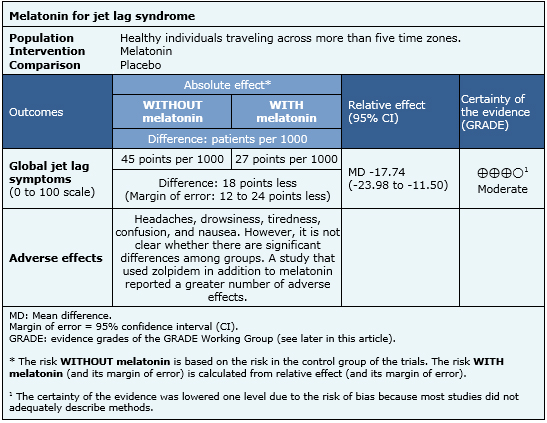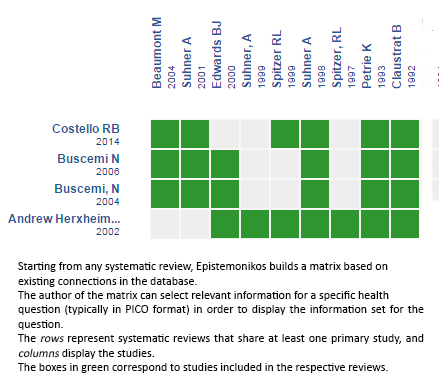Resúmenes Epistemonikos
← vista completaPublicado el 22 de diciembre de 2015 | http://doi.org/10.5867/medwave.2015.6343
¿Sirve la melatonina para el jet lag?
Is melatonin useful for jet lag?
Abstract
Jet lag syndrome is an exogenous circadian rhythm sleep disorder, frequently reported in travelers who cross multiple time zones in a short period of time. Oral melatonin -a pineal neurohormone normally produced during darkness and responsible for regulating the body's circadian rhythms- has been used as treatment for this condition. Searching in Epistemonikos database, which is maintained by screening 30 databases, we identified four systematic reviews including 11 randomized trials. We combined the evidence using meta-analysis and generated a summary of findings table following the GRADE approach. We concluded the use of oral melatonin probably reduces symptoms associated with jet lag syndrome. It is not clear whether its use produces adverse effects; however, these would be probably mild.
Problem
Jet lag syndrome is an exogenous circadian rhythm sleep disorder, frequently reported in travelers who cross multiple time zones in a short period of time. It is characterized by symptoms such as sleep disturbances, daytime fatigue, irritability, anxiety, nausea, diarrhea and sweating. This condition is caused by a desyncronization between the traveler´s endogenous circadian rhythm and the day-night cycle at the final destination, which tends to wear off with time. The severity of jet lag syndrome depends on the number of time zones and direction travelled.
The exogenous administration of oral melatonin -a pineal neurohormone normally produced during darkness and responsible for regulating the body´s circadian rhythms- has been used as treatment for jet lag syndrome. This oral supplement is sold as an inexpensive over-the-counter drug, and considered relatively safe to use.
Methods
We used Epistemonikos database, which is maintained by screening more than 30 databases, to identify systematic reviews and their included primary studies. With this information, we generated a structured summary using a pre-established format, which includes key messages, a summary of the body of evidence (presented as an evidence matrix in Epistemonikos), meta-analysis of the total of studies, a summary of findings table following the GRADE approach and a table of other considerations for decision-making.
|
Key messages
|
About the body of evidence for this question
|
What is the evidence. |
We found four systematic reviews [1],[2],[3],[4] that included 11 randomized controlled trials reported in 16 references [5],[6],[7],[8],[9],[10],[11],[12],[13],[14], [15],[16],[17],[18],[19],[20]. |
|
What types of patients were included |
All studies involved healthy adults. One study [8] included members of the United States Air Force and a second one [13] involved airline staff. All other studies included different passengers who volunteered to participate. Ten studies assessed the use of melatonin in eastward flights [5],[6],[8],[9],[10],[11],[12],[16],[19],[20], while four did so for westward flights [5],[11],[12],[13]. |
|
What types of interventions were included |
All studies used melatonin. Ten studies used 5 mg [5],[6],[8],[10],[11],[12],[13],[16],[19],[20]. One administered 10 mg [9]. Three studies assessed slow-release melatonin; one study 300 mg [8], one study used 0.5 mg followed by 2 mg [20] and one study 0.5 mg [16]. Similarly, while two studies administered melatonin before the flight [6],[12], six did so upon arrival [9],[10],[11],[16] ,[19],[20] and three did so both before and after flying [5],[8],[13]. All studies administered melatonin before the desired time of sleep onset at the final destination. In one study both groups received zolpidem in addition to melatonin [19]. All studies compared melatonin against placebo. |
|
What types of outcomes |
The systematic reviews included the following outcomes:
Additionally, some reviews reported two other outcomes related to exogenous circadian rhythm sleep disorders in general and not only jet lag [2]:
Only one review conducted a meta-analysis of the following adverse effects [2]: headaches, drowsiness, tiredness, and nausea. These adverse effects were also compared to the use of melatonin studies in non-jet lag cases. All other reviews reported adverse effects without providing a pooled effect measure. |
Summary of findings
The information on the use of melatonin is based on 11 randomized studies. Ten studies reported global jet lag symptoms [5],[6],[9],[10],[11],[12],[13],[16],[19],[20]. However, only four studies provided data in a way that could be added to a meta-analysis [5],[6],[9],[11]. Generally, all studies reported side effects, but only three did so systematically [10],[19],[20].
- Melatonin probably reduces the global symptoms associated to jet lag syndrome in travellers crossing more than five time zones. The certainty of the evidence is moderate.
- It is not clear whether the use of oral melatonin is associated to adverse effects (nausea, tiredness, drowsiness and headaches) because the certainty of the evidence is very low. However, no serious adverse effects were reported in any of the participants across the studies.


Other considerations for decision-making
|
To whom this evidence does and does not apply |
|
| About the outcomes included in this summary |
|
| Balance between benefits and risks, and certainty of the evidence |
|
| What would patients and their doctors think about this intervention |
|
| Resource considerations |
|
|
Differences between this summary and other sources |
|
| Could this evidence change in the future? |
|
How we conducted this summary
Using automated and collaborative means, we compiled all the relevant evidence for the question of interest and we present it as a matrix of evidence.

Follow the link to access the interactive version: Melatonin for jet lag
Notes
The upper portion of the matrix of evidence will display a warning of “new evidence” if new systematic reviews are published after the publication of this summary. Even though the project considers the periodical update of these summaries, users are invited to comment in Medwave or to contact the authors through email if they find new evidence and the summary should be updated earlier. After creating an account in Epistemonikos, users will be able to save the matrixes and to receive automated notifications any time new evidence potentially relevant for the question appears.
The details about the methods used to produce these summaries are described here http://dx.doi.org/10.5867/medwave.2014.06.5997.
Epistemonikos foundation is a non-for-profit organization aiming to bring information closer to health decision-makers with technology. Its main development is Epistemonikos database (www.epistemonikos.org).
These summaries follow a rigorous process of internal peer review.
Conflicts of interest
The authors do not have relevant interests to declare.

